Bugs and Fertility
Good bugs, bad bugs and fertility
I remember it was 2002 and I was just about to graduate from my Bachelor of Naturopathy and we had a lecture focusing on the exciting new era of information coming out about good bacteria in the digestive tract.
Now, with hundreds of thousands of studies later the specifics of what we know about bacteria throughout (an on) our bodies are truly amazing. For example, we know specifics about the times of bugs in our bowels right through to those in the vagina and how they are different to the strains/dominance we find of those in the uterus.
A healthy microbiome in each part of your body is largely influenced by the types/numbers of bugs in your gut (digestive tract) so starting to build a healthy gut microbiome is really important and to get started, really quite simple.
How Can you Improve The Good Bacteria in Your Gut?
Here are four simple steps to get started.
STEP 1 Remove added sugar
Excess sugar is likely impacting the colonisation of the good bacteria in the gut, meaning it inhibits a substance that helps good bacteria hang out in the gut and grow. An article from PBS discusses this here.
This goes for artificial sweeteners too. A study showed that mice fed artificial sweeteners versus sugar water had more changes in their gut bacteria increasing the bad bacteria present. See the article here.
Eliminate high glycemic carbohydrates from your diet (ref: www.glycemicindex.com) i.e. white flour, high GI white rice, white potato, etc., which cause significant increases in blood glucose levels that are difficult for the body to handle, eventually causing inflammation and suppressing immune system function.
STEP 2- Decrease your intake of refined foods.
Does your diet consist of highly processed foods which do not support healthy good bacteria growth in the gut to address and outnumber the more damaging bacteria? Does most of your diet come from a wrapper, a box, a can or from a drive thru?
If so move more toward whole food diets where you are eating 70% fresh foods in your diet. To help the growth of the right type of bacteria we need to have good sources of fibre and healthy bowel function and a 70% fresh food diet will help you to achieve this.
For example, eat salads and vegetables with protein instead of sandwiches and packaged foods.
Give up soft drinks, whether regular or diet. Drink mostly water.
Decrease alcohol consumption no more than 4 per week (another source of excess sugar)
Step 3 Make sure you are getting foods that help healthy bacteria to thrive in your gut.
You can do this by eating foods that contain prebiotics. Prebiotics help feed the good bacteria in your body.
Examples of prebiotics include:
● artichokes
● chicory root
● raw oats (if you are not gluten free)
● unrefined wheat (if you are not gluten free)
● unrefined barley (if you are not gluten free)
● bananas
● berries
● asparagus
● garlic
● flaxseed
● tomatoes
● greens
● legumes
Step 4- Take the right probiotic
Top it off with a high quality probiotic (good bacteria) each day.
Not all probiotics are created equal and it’s not a one size fits all situation. The type, strains and numbers of bacteria are really very specific to your health, history, medications, symptoms, diet and goals. So we recommend speaking to us in your next appointment to work out exactly if/which probiotic you should be taking.
How do you take these? Ideally it’s best to take a minimum of 30 min before food, this gives the probiotic time to settle into and support the flora of the gut. But we often recommend taking them right before bed to allow for there to be no interference with food over the hours that you’re sleeping.
If you take a probiotic for the first time or for a short time and you have lower abdominal cramping, let us know in your next appointment as it might mean that more work is required to help create a healthy microbiome and a healthy integrity of your digestive tract.
Step 5:
Ok, we know we only said 4 steps. But the fifth step is to work closely with your Naturopath to help determine the other factors that might be interfering with your microbiome. Stress, hormonal shifts such as through fertility treatment, pregnancy and post partum, your environment, your personal care products and your sleep are all factors which we need to consider. Reach out to us at info@naturalfertility.com or visit https://www.naturalfertility.com/book-now to book your appointment.
Here at Natural Fertility Co we have been helping patients with their microbiome for fertility and hormone health for over two decades. This is a critical to help create your plan to improve your fertility potential for a natural conception or to help you prepare for a procedure. If you would like to book your first consultation with us to assess if and which probotics might benefit you then please go to our booking page.

